Category: Personal Support Worker
Using the Gentle Persuasive Approach as a Personal Support Worker: Key Strategies and Benefits
February 23, 2024
Calling all future personal support workers! Today, we’re exploring a powerful technique for dealing with clients living with dementia. It’s known as the Gentle Persuasive Approach (GPA). This approach is a philosophy that transforms the way we care for others, ensuring compassionate, person-centered care for the individual.
The Gentle, Persuasive Approach effectively diffuses escalated scenarios in a care setting, improving safety, fostering good communication, and focusing on the person rather than the disease. Understanding the GPA technique as a personal support worker will make you a sought-after candidate when entering your first position. Let’s explore this valuable strategy!
Understanding the Gentle, Persuasive Approach
What is the gentle approach to dementia? The term “GPA” in dementia care refers to the Gentle Persuasive Approach. This specialized, evidence-based method is designed for healthcare providers working with older adults with dementia and other cognitive impairments. What is the GPA approach? It’s a thoughtful, person-centered care strategy that emphasizes understanding and empathy. The idea is to see things from the client’s perspective and respond with compassion and respect. It starkly contrasts with more traditional, directive methods and truly puts the person at the center of care. It involves:
- Understanding dementia, including its symptoms, progression, and challenges for individuals with it. This knowledge helps caregivers to be more empathetic and patient in their interactions.
- Person-Centered Care: GPA advocates for person-centered care, recognizing each individual as unique, with specific preferences and needs. This approach respects the person’s dignity and autonomy, even as cognitive abilities decline.
- Non-Violent Crisis Intervention: GPA teaches non-violent de-escalation techniques and how to respond to challenging behaviors often exhibited by individuals with dementia. This includes understanding the triggers for such behaviors and how to prevent or reduce them.
- Communication Strategies: Effective communication strategies are a core component of GPA. This involves learning to use verbal and non-verbal cues to communicate effectively with individuals who may have difficulty understanding or expressing themselves.
- Hands-On Techniques: GPA provides practical, hands-on techniques to guide and assist individuals with dementia in activities of daily living. These techniques are designed to be respectful and gentle and minimize the risk of harm to the caregiver and client.
- Teamwork and Collaboration: GPA encourages teamwork and collaboration among caregivers, recognizing that caring for individuals with dementia is a shared responsibility.
- Continuous Learning and Adaptation: The approach promotes constant learning and adaptation of care strategies as the needs of the individual with dementia change over time.

GPA Best Practices to Remember
Let’s talk about best practices. First and foremost, as part of a gentle, persuasive approach, building trust and rapport is crucial. It’s about creating a bond with clients, showing them they’re in safe, caring hands. Communication is key – and not just the words we use. Our tone, facial expressions, and body language all play a part in conveying respect and understanding.
Managing behaviors is another vital aspect. Sometimes, clients may feel anxious or confused, and it’s our job to recognize these signs and respond in a way that soothes and reassures them. This leads us to de-escalation techniques. It’s all about staying calm and composed, using gentle persuasion rather than force to defuse challenging situations.
Benefits of Using the Gentle Persuasive Approach
The benefits for practitioners and, especially, for clients are immense! With the use of GPA dementia care methods, we see more substantial positive relationships with clients. There’s a noticeable reduction in conflicts and injuries, making the environment safer for everyone.
Plus, mastering the GPA can improve your professional growth and job satisfaction. Of course, it can be challenging sailing. You might encounter resistance or need help to stay patient. The key is persistence and continuous learning. Don’t hesitate to seek support from colleagues or additional training.

The Gentle Persuasive Approach is a mindset shift that enriches the way we interact with our clients. The personal support worker diploma at Medix College prepares students to tailor support to each individual’s needs they work with, providing outstanding care and accessing opportunities to advance their careers. By embracing GPA, PSWs can foster more meaningful, respectful, and compelling care experiences.
Frequently Asked Questions
Q: What is the gentle approach to dementia?
A: The term “GPA” in dementia care refers to the Gentle Persuasive Approach. This specialized, evidence-based method is designed for healthcare providers working with older adults with dementia and other cognitive impairments.
Q: What is the GPA approach?
A: It’s a thoughtful, person-centered care strategy emphasizing understanding and empathy.
Are you ready to start our personal support worker course?
Contact Medix College for more information!
What’s the Difference Between a Personal Support Worker and a Community Service Worker?
February 16, 2024
The roles of Personal Support Worker (PSW) and Community Service Worker (CSW) are crucial in healthcare, yet they often need clarification. Both positions play essential roles in supporting individuals and communities but cater to different needs and settings. Understanding the difference between PSW and CSW is crucial for aspiring professionals to choose the path that best aligns with their career goals and for the community to recognize and appreciate the distinct contributions of each profession.
What Does CSW Mean?
The acronym CSW, which stands for Community Service Worker, embodies the core of the occupation—service to the community. It symbolizes a dedication to societal reform advocacy, social justice, and helping others overcome obstacles that impede their well-being. What does a CSW do?
Community Service Workers engage in activities that strengthen communities and assist individuals in navigating various social systems. Their work includes developing and implementing community programs, providing crisis intervention, counselling, and directing clients to relevant resources and services. CSWs are often seen as bridges between vulnerable populations and the support systems designed to assist them.

CSW vs PSW: The Core Differences
While the roles of a CSW and PSW might seem similar at first glance, the difference between PSW and CSW is profound, reflecting the diverse needs of individuals and communities they serve. Understanding these distinctions is the first step in recognizing the valuable contributions of each profession and choosing a path that aligns with your passion for making a difference in the lives of others.
At its core, the difference between a PSW and a CSW is in their primary focus areas and the environments in which they operate. What is the difference between CSW and PSW? A Personal Support Worker is primarily involved in individual care, assisting clients with daily living activities. On the other hand, a Community Service Worker focuses more on the social aspects of care.
Personal Support Workers provide physical support, including, but not limited to, helping with personal hygiene and mobility and ensuring clients’ well-being, typically in residential care facilities, hospitals, and homes.
CSWs aim to improve the quality of life for individuals and groups through community development, advocacy, and support programs. They work in a variety of settings, including social service agencies, schools, and non-profit organizations, addressing broader issues such as poverty, addiction, and mental health.
Integrating PSW and CSW Roles in Healthcare and Social Services
While the roles of PSW and CSW are distinct, they are complementary within the healthcare and social service sectors. PSWs provide the necessary personal care that enables individuals to live dignified lives, often working closely with CSWs who facilitate access to broader community resources and support services. Together, they form a holistic approach to care and support, addressing both the immediate physical needs and individuals’ longer-term social and emotional well-being.
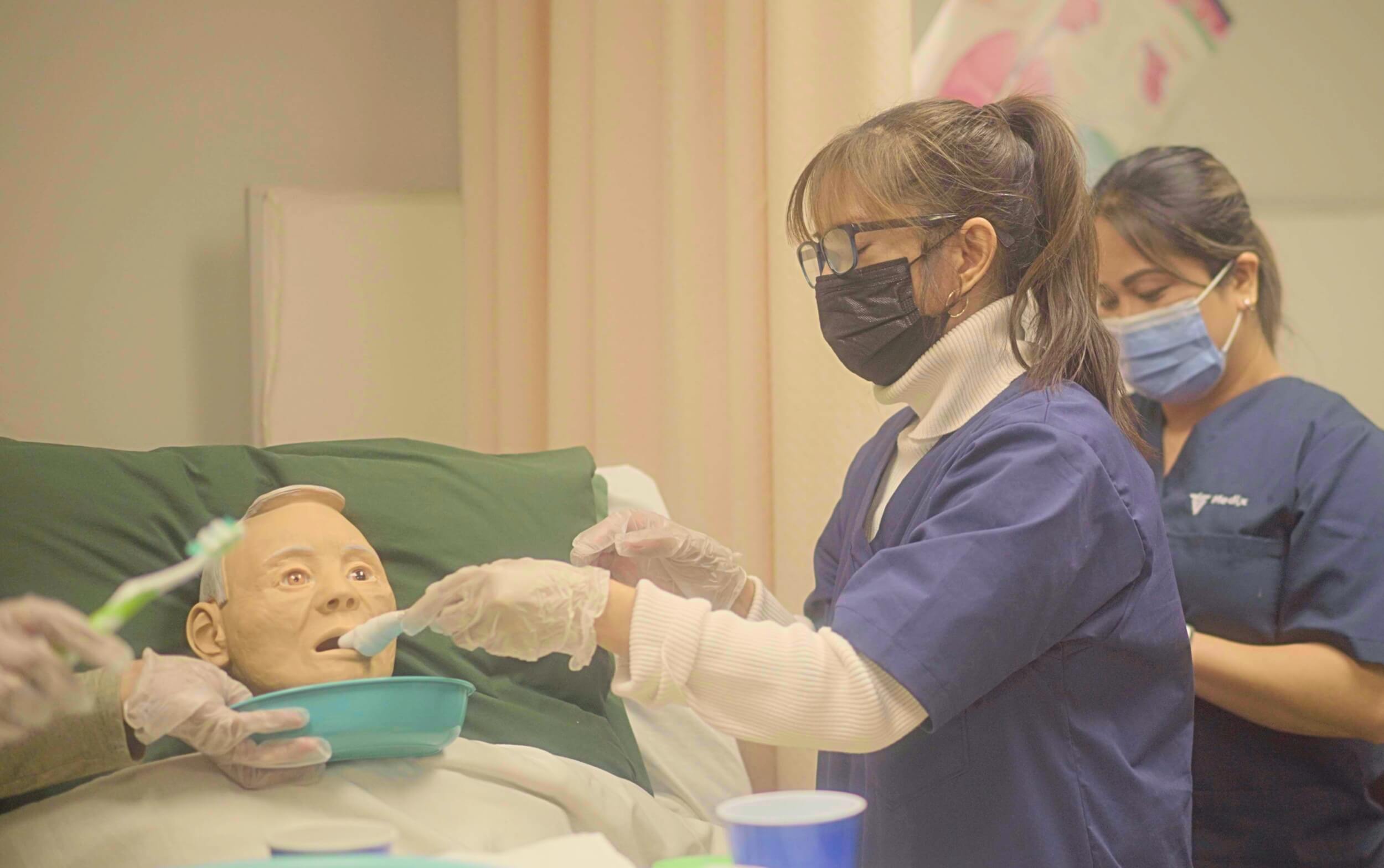
Choosing Between a PSW and CSW Career
For those trying to choose between a CSW vs PSW career, reflecting on your interests and strengths is essential. If you’re drawn to direct patient care and have a compassionate nature, a career as a PSW might be more fulfilling. Alternatively, if you’re passionate about social justice, community development, and advocating for change, pursuing a career as a CSW could be the right path for you.
Medix College offers programs tailored to both professions, providing the knowledge, skills, and practical experience to impact your chosen field significantly. Whether you aim to become a Personal Support Worker or a Community Service Worker, Medix College supports your journey towards a rewarding career.
Frequently Asked Questions
Q: What is the difference between CSW and PSW?
A: A Personal Support Worker is primarily involved in individual care, assisting clients with daily living activities. On the other hand, a Community Service Worker focuses more on the social aspects of care.
Q: What does a CSW do?
A: Community Service Workers engage in activities that strengthen communities and assist individuals in navigating various social systems.
Q: What does CSW mean?
A: The acronym CSW, which stands for Community Service Worker, embodies the core of the occupation—service to the community.
Are you interested in a community service worker course or a personal support worker course?
Contact Medix College for more information.
Ace Your Interview: Top Personal Support Worker Interview Questions
October 18, 2023
Landing an interview is a big step toward securing a personal support worker role. Acing the interview will take you even closer. As you can imagine, however, this is a more complex proposition.
Support workers bear the responsibility of safeguarding vulnerable populations. Consequently, organizations hiring these professionals aim to ensure they possess the qualifications to cater to the needs of their patients. With that said, with adequate preparation and knowledge of common PSW interview questions, you can increase your chances of passing that interview.
You may wonder, “How do I prepare for a PSW interview?’ The best place to start is by researching the organization, understanding the role’s responsibilities, and reviewing common interview questions. Reflect on past experiences, highlighting skills and scenarios where you provided care or managed challenges. Practice responses, dress professionally, and prepare thoughtful questions to ask the interviewer. Confidence and empathy are key.
Understanding the Role of a Personal Support Worker (PSW)
The role of a Personal Support Worker (PSW) is a demanding combination of physical care, emotional support, and commitment to facilitating clients’ independence. Candidates must understand that their responsibilities range from assisting with daily tasks like dressing and feeding to providing emotional comfort during challenging times.
One of the most common personal support worker interview questions is, “Can you describe what you think a care worker does?” This question tests your knowledge of the practical aspects and your understanding of the emotional nuances of the job.
Another question to anticipate is, “How do you balance providing assistance and allowing independence for clients?” An excellent way to respond to this question is to state that you ensure a balance by actively listening to clients and understanding their capabilities and desires. While providing essential assistance, you also encourage them to perform tasks they’re comfortable with. This promotes self-reliance and dignity, ensuring care is tailored to each individual’s needs and fostering safety and autonomy.
Interviewers typically also want to know why you’re interested in the role. When faced with a question like “Why do you want to work as a PSW?” the best reply would be to state that you’re drawn to work as a PSW because you have a genuine desire to support and uplift those in need. The role offers a chance to make meaningful connections, improve the quality of life for individuals, and contribute positively to your community. You value empathy, continuous learning, and hands-on care.
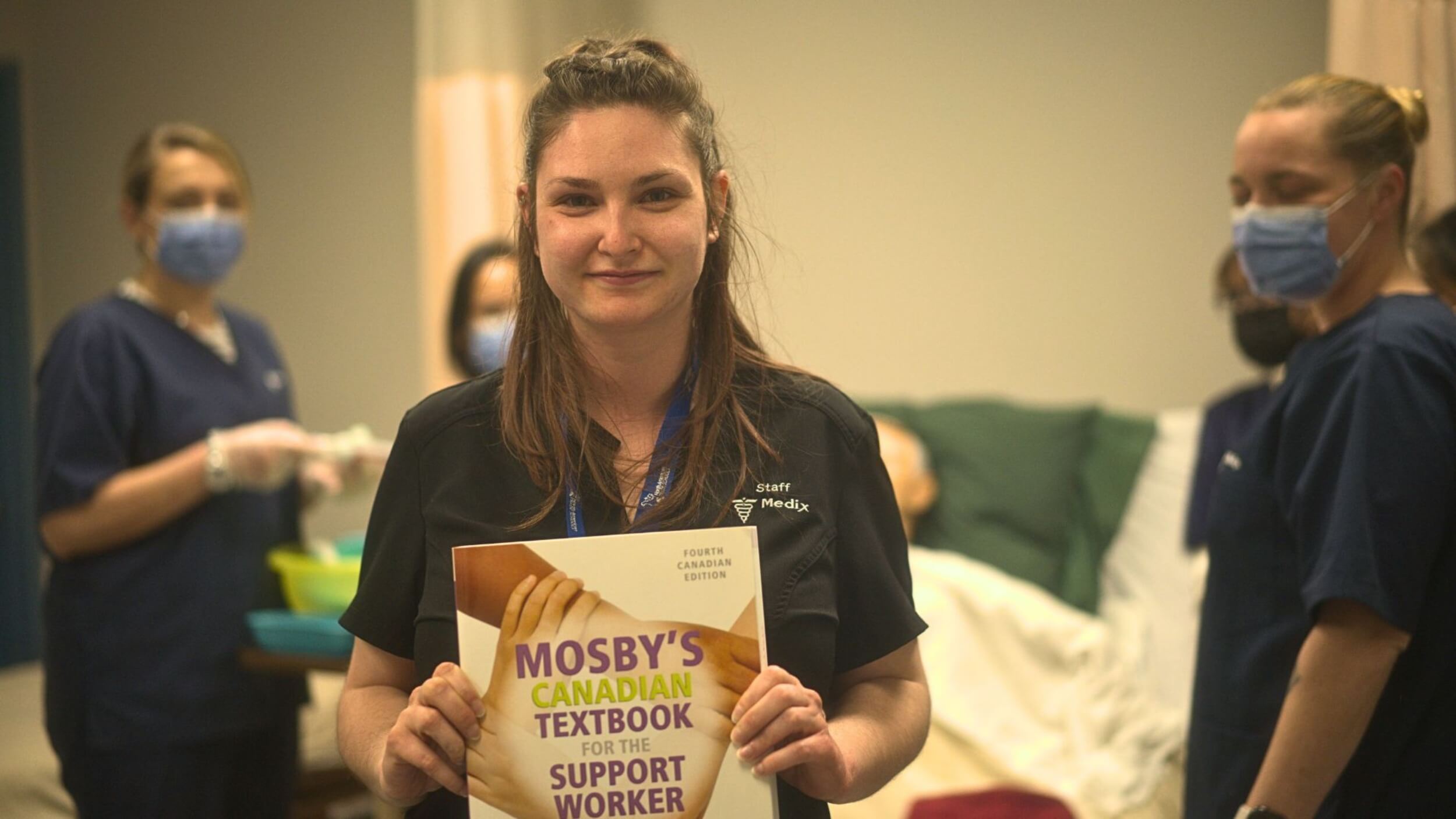
If you’re asked, “Why did you choose the Personal Support Worker program?” You pursued the Personal Support Worker program because of your deep-rooted passion for helping others. You wanted a career where you could make a tangible difference in individuals’ lives, providing them with the support and care they need to live fulfilling lives, while also continually learning and growing professionally.
Highlighting Your Qualities and Experience
In the world of care, every individual brings a unique blend of experiences, skills, and personal traits. Candidates must differentiate themselves by emphasizing how their past roles have equipped them for the challenges of a PSW position. You might be asked, “What can you bring to this support worker position?” This is your moment to showcase specific instances from your past roles that highlight transferable skills, lessons learned, and challenges overcome. Another question, like “Tell me about a challenging experience and how you managed it?” provides a chance to display problem-solving skills and emotional intelligence.
Addressing Potential Challenges and Situations
Working as a PSW means facing varying challenges daily. Whether handling stressful situations, preserving client dignity, or assessing individual needs, interviewers want to ensure you’re up for the task. PSW interview questions such as “How do you manage stressful scenarios involving clients?” or “How do you maintain a client’s dignity during personal care?” to gauge your capacity to handle sensitive situations with grace and professionalism. Communicating a balanced approach is crucial, emphasizing understanding each client’s unique needs, promoting open communication, and fostering independence where possible.
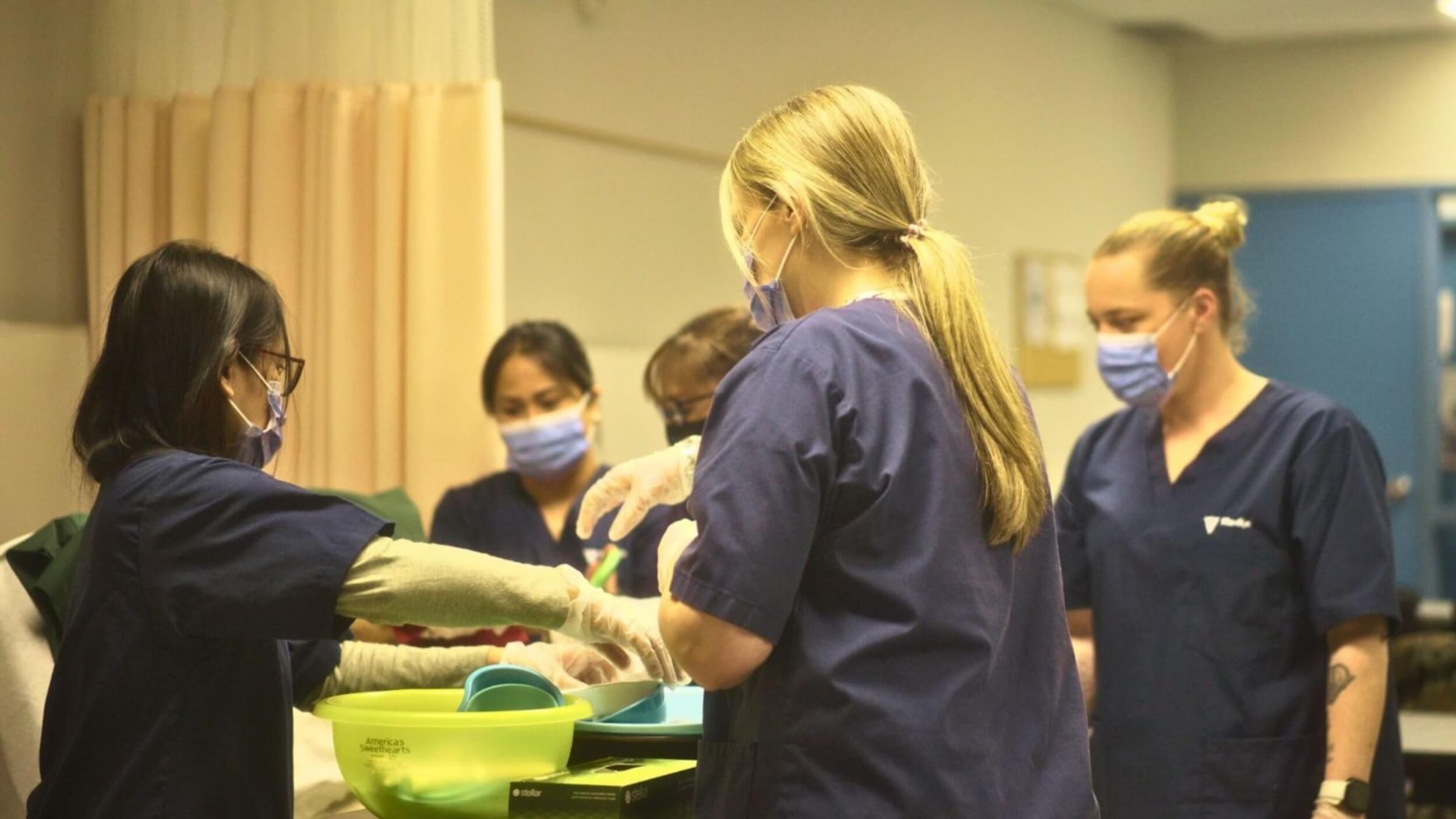
Engaging in a Two-Way Interview Process
An interview isn’t just about employers evaluating potential hires—it’s also an opportunity for candidates to assess the organization. Engaging actively by posing questions demonstrates initiative and genuine interest. Questions such as “How will my performance be evaluated?” or “What resources and support are available for training?” can provide insights into the organization’s values and commitment to employee growth.
Further, asking about team dynamics and challenges the team faces or expectations for the initial months can give a clearer picture of the environment. Being proactive and ensuring that the organization aligns with your values and career aspirations is essential.
FAQs To Consider:
How do I prepare for a PSW interview?
The best place to start is by researching the organization, understanding the role’s responsibilities, and reviewing common interview questions. Reflect on past experiences, highlighting skills and scenarios where you provided care or managed challenges. Practice responses, dress professionally, and prepare thoughtful questions to ask the interviewer. Confidence and empathy are key.
Why did you choose the personal support worker program?
You pursued the Personal Support Worker program because of your deep-rooted passion for helping others. You wanted a career where you could make a tangible difference in individuals’ lives, providing them with the support and care they need to live fulfilling lives, while also continually learning and growing professionally.
Why do you want to work as a PSW?
You’re drawn to work as a PSW because you have a genuine desire to support and uplift those in need. The role offers a chance to make meaningful connections, improve the quality of life for individuals, and contribute positively to your community. You value empathy, continuous learning, and hands-on care.
Are you interested in a PSW online course?
Contact Medix College for more information.
Unveiling the Core Responsibilities: Personal Support Worker Duties Explained
September 29, 2023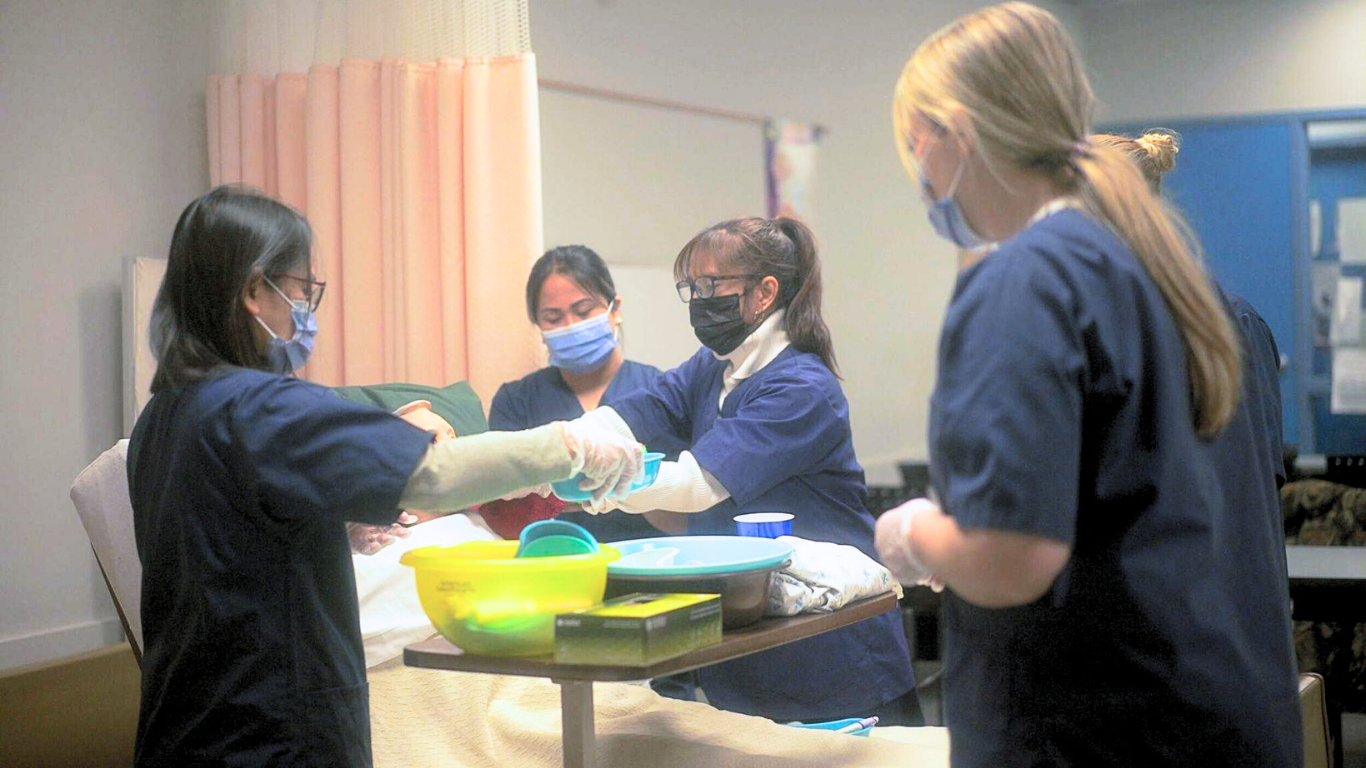
Personal Support Workers (PSWs) are frontline champions who ensure many individuals’ daily care and well-being. A Personal Support Worker typically assists clients with daily personal care routines like bathing and dressing, prepares nutritious meals, offers medication reminders, provides mobility assistance, and offers emotional and social support. They also perform light housekeeping duties and maintain records of the client’s health and activities.
This post seeks to illuminate these duties and responsibilities, offering a clearer understanding of the essential function PSWs play in healthcare.
Who Is a Personal Support Worker?
A PSW is a caregiver trained to provide assistance to individuals in need. Whether it’s the elderly, those with chronic illnesses, or individuals with physical disabilities, PSWs are equipped to offer support that enables these people to lead more independent, fulfilling lives.
A Personal Support Worker cares for a patient’s physical, mental, and emotional health, especially when illness or age impedes their self-care capabilities. Critical tasks for a PSW include preparing balanced meals, assisting with everyday hygiene routines, and collaborating with a diverse healthcare team to ensure the highest standard of care.
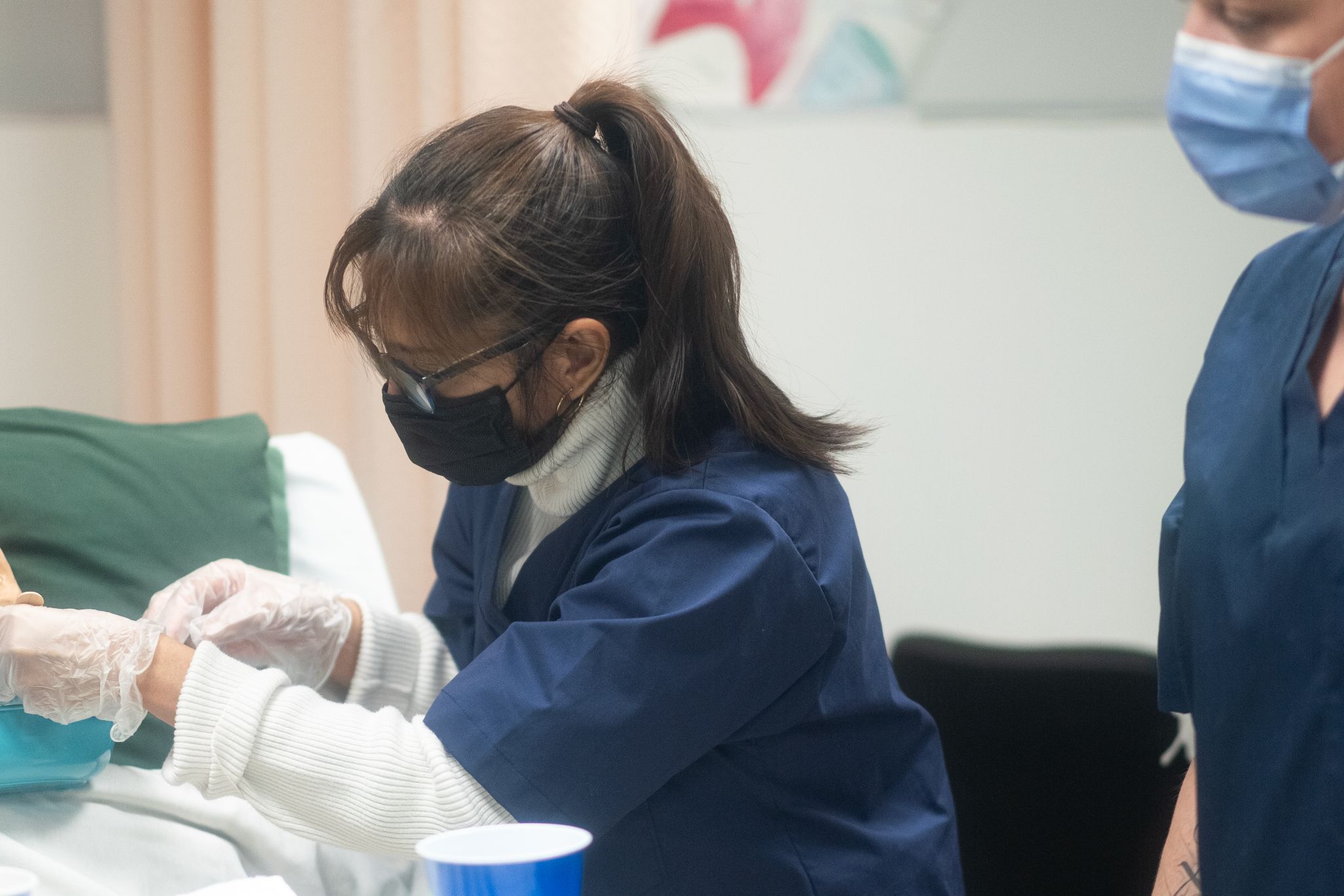
The duties and responsibilities of a PSW extend beyond merely assisting with daily tasks. They are the heart and soul of a care system designed to offer holistic support to individuals who need it most. Personal support worker duties, though varied, center on the individual’s well-being, ensuring that their physical and emotional needs are met. It’s a role that requires compassion, dedication, and a genuine love for helping others – and it’s a role that makes a world of difference every single day.
Understanding the Core Personal Support Worker Duties
One of the most immediate Personal Support Worker duties is personal care. This includes helping individuals with daily tasks such as bathing, dressing, grooming, and mobility. This duty ensures that individuals remain hygienic and dignified, even when they cannot perform these tasks independently. Nutritional needs are also essential, and a PSW is often responsible for meal planning, preparation, and sometimes feeding those who cannot do so for themselves. It’s not just about making food; it’s also about ensuring that meals are balanced and cater to any dietary restrictions.
While PSWs are not typically qualified to administer medications, they play a significant role in medication management. This could mean reminding the individual to take their pills, assisting in organizing a medication schedule, or even helping to apply medicinal creams or ointments. For those with physical limitations, moving around can be a challenge. Personal support worker duties include assisting with mobility – helping someone out of bed, aiding with transfers, or providing support during physiotherapy exercises.

Beyond the physical, the emotional well-being of an individual is paramount. PSWs often become confidants and friends to those in their care. They listen, provide companionship, and may even accompany individuals to social events or outings, ensuring a holistic approach to care. Further, a clean and safe environment is vital for health and recovery. PSWs may engage in light housekeeping duties like cleaning, laundry, or even shopping for essentials, ensuring the living environment remains conducive to healing and daily living.
Another crucial responsibility is keeping track of an individual’s daily activities, health changes, and potential concerns. PSWs contribute to the broader healthcare team’s knowledge by documenting these details, facilitating better long-term care strategies. As part of an extended team, PSWs liaise with nurses, doctors, therapists, and other healthcare professionals. They provide vital insights into the patient’s daily life and any immediate concerns, bridging the gap between home care and clinical care. Personal Support Workers (PSWs) skills involve communication, problem-solving, emotional intelligence, and time management.
FAQs To Consider:
What are the primary duties and responsibilities of a PSW?
A Personal Support Worker cares for a patient’s physical, mental, and emotional health, especially when illness or age impedes their self-care capabilities. Critical tasks for a PSW include preparing balanced meals, assisting with everyday hygiene routines, and collaborating with a diverse healthcare team to ensure the highest standard of care.
What skills are required to be a personal support worker?
Personal Support Workers (PSWs) skills involve effective communication, problem-solving, emotional intelligence, and time management – in order to provide the best care to their patients.
What is a typical day for a personal support worker?
A Personal Support Worker typically assists clients with daily personal care routines like bathing and dressing, prepares nutritious meals, offers medication reminders, provides mobility assistance, and offers emotional and social support. They also perform light housekeeping duties and maintain records of the client’s health and activities.
Are you interested in Personal Support Worker training?
Contact Medix College for more information.
What Does a PSW Do? Understanding the Role of a Personal Support Worker
June 30, 2023
Personal Support Workers (PSW) are vital members of the healthcare team. Not only do they provide care and support to vulnerable individuals, helping them live more fulfilling lives, but by doing so, they also help relieve the stress and demands on other healthcare workers. The role of a PSW is essential in any inclusive society that aims to enhance the quality of life of its population.
Those who are considering a career in healthcare may be more familiar with other roles within the field, such as nurses, physicians, and medical assistants, but a career as a PSW can be just as rewarding. If you are trying to determine what career path to take, understanding the roles and responsibilities of a Personal Support Worker might help you figure out if this is the job for you. Read on to learn more.
Why Are Personal Support Workers Needed?
With the aging population, healthcare professionals are growing increasingly in demand. Given that Personal Support Workers play a critical role in providing care and support for seniors, their work is highly valued in the healthcare industry. In addition to providing daily assistance with tasks such as meal preparation, household management, aiding with bathing, and other aspects of personal hygiene, PSWs play an important role in promoting health and wellness. By doing so, they provide preventive care, helping lessen the burden on hospitals and healthcare centers.

To become a Personal Support Worker, you must obtain certification from an accredited institution. This is because, through your Personal Support Worker course, you will get hands-on training and develop a broad range of abilities needed to provide professional care to your clients. You will also learn how to collaborate with other healthcare professionals to ensure your clients get the care and medical support they need.
Main Duties and Responsibilities
The main role of Personal Support Workers are to help clients maintain their independence. This is done through several different tasks–depending on the individual needs of each client. It is common for PSWs to help clients maintain personal hygiene by assisting them with bathing, dressing, and toileting. In addition, Personal Support Workers must ensure that clients take their medications and assist them with mobility if needed. Meal preparation, household management, feeding, and bedside care are also some of the most common duties for PSWs. Given the compassionate nature of the role, PSWs need to communicate clearly and compassionately with clients and assist them with their social and emotional needs.

Those taking a PSW course online will have regular in-person practical labs to practice the theory they learn online. In addition, an externship will help them bridge the gap between the classroom and the work environment.
Different Career Paths You Can Take After PSW Training
After Personal Support Worker training, you will likely find employment in health centres, long-term care facilities, private care facilities, and group homes. PSWs can also work at clients’ homes depending on the kind of attention required by clients. Although many Personal Support Workers work with healthcare agencies and institutions, some may choose to work independently or work for a private household. Roles and responsibilities may vary depending on the type of work setting.
Are you interested in a PSW course in Canada?
Contact Medix College to learn how you can get started.
FAQs
Q: How to become a PSW
A: To become a Personal Support Worker, you must complete a certified PSW program. Through it, you will learn how to effectively provide care and assistance to clients and families, helping them to live fulfilling lives in their communities and institutions.
Q: What does a Personal Support Worker do?
A: Personal Support Workers are healthcare professionals who provide essential care and support to individuals who cannot complete daily activities alone, such as those who are aging, chronically ill, and/or have physical/mental disabilities.
Q: What do you need to be a PSW?
A: To be eligible to apply for Personal Support Worker positions, you must have completed a certified PSW program, have all the documentation and certifications required by the employer, such as CPR and first aid certifications, and have some hands-on experience. Empathy, compassion, and collaboration are common traits of PSWs.
Understanding The Plan of Care After Personal Support Worker Training
June 09, 2023
Personal Support Workers (PSWs) are healthcare professionals that provide support, care, and assistance to people who are mostly experiencing various types of incapacities. Their clients include the elderly and those suffering from physical and mental illnesses, as well as other forms of prolonged illnesses. Because of how crucial the support provided by the PSWs is to the personal welfare of their clients, a “Plan of Care” is a requirement for their job.
Here, we discuss some of the details included in a typical plan of care in a bid to help PSWs understand how best to meet the specific needs of their clients. If you’re considering PSW training, read on to learn more.
Plan Of Care in a Personal Support Worker Career
After Personal Support Worker training, PSWs develop a plan of care for their clients as a means to provide the regular support their clients need in their everyday lives. This plan of care provides a detailed description of the activities they partake in and the services they offer as part of the support they give their clients. They may include important details like personal care assistance, medication assistance, mental and emotional support, and other factors needed for their daily sustenance.
Below is a description of some key components that go into a plan of care program as administered by PSWs to people in palliative care homes, support housing and other long-term care facilities.
Client Assessment
PSWs start by evaluating each of their clients to know what specific needs they have and what conditions they are currently experiencing. They go through the medical histories of their clients and take notes from physical examinations undertaken to identify any challenges they may face. They may also consult the family of their client to gather any relevant information. The information gathered from this process helps them determine what plan of care is suited for each client.

Development of the Care Plan
PSWs are responsible for creating a care plan that guides them while attending to their clients. This care plan will shape the nature and quality of their client interactions. It may include a physical examination routine, a dietary regimen, cognitive assessments, and other support schedules. Drawing inspiration from their PSW training, this plan will establish targets and milestones while setting timeframes and defining each point of call in their care schedule.
Personal Care Assistance
Personal care assistance is an essential part of the plan of care activities that PSWs line up for their clients. The activities include those everyday exercises that contribute to their upkeep. PSWs may help clients in bathing, grooming, dressing up, and in navigating their surroundings.
The care plan will also cover the feeding needs of each client. PSWs plan and prepare the meals each client will receive daily, and they do this while considering their eating habits and any dietary constraints unique to each client.
Medication Assistance
PSWs also help in administering medication according to set prescriptions. They gain important medical knowledge and experience over the course of their Personal Support Worker career. And so they know what dosage to use and when the medication should be given to the clients.

After clients take their required medication, PSWs must watch them closely for signs of any side effects or undesirable outcomes. If they observe any unexpected reactions to medications, the PSWs will report them to the resident medical director or healthcare administrator.
Are you considering earning your Personal Support Worker diploma?
Contact Medix College to learn how you can get started.
FAQ
What is a personal support worker?
A personal support worker is a healthcare professional who provides assistance and support to individuals who require help with their daily activities due to physical, cognitive, or emotional challenges. They work closely with clients to ensure their well-being and promote independence.
How to become a personal support worker
To become a Personal Support Worker (PSW), complete a recognized PSW program, which typically takes about 6-12 months. Obtain the required certifications, such as First Aid and CPR, and gain practical experience through internships or volunteer work. Apply for PSW positions in healthcare facilities or home care agencies.
3 Meal Planning Tips to Remember After Personal Support Worker Training
March 24, 2023Nutrition is a vital aspect of a person’s health, so having well-balanced and healthy meals throughout the day is important. People needing support are no different, and their meal needs may be even greater than those of a regular individual. It can be challenging to cook and plan for these needs, and that is why during Personal Support Worker training, you will receive valuable information and guidance on meal preparation.
If you want to learn about some of these tips for meal planning while working as a Personal Support Worker, continue reading.
1. Refresh the Meal Planning With New Dishes
It is good to have a routine and plan to keep things organized and ensure the patient receives the nutrition and calories they need, as taught in your training; however, most people don’t enjoy eating the same or similar meals repeatedly. Sometimes, preparing different meals and thinking outside the box can be very effective. Ensure you plan for it beforehand so you remain organized. This change can be done in a variety of ways. You can change how the meal is presented as one option or look for a meal providing similar nutritional values while offering a different taste.
During Personal Support Worker training, you will learn about several nutritious ingredients and meals you can utilize, so try mixing it up using this knowledge. For instance, instead of serving pasta with chicken every week, try swapping the chicken for minced meat or offer a chicken salad packed with nutrients and calories. It is good to serve different meals to keep the patient’s emotions, taste buds, and stomach happy.

2. Consider the Patient’s Health as Taught in Personal Support Worker Training
During Personal Support Worker courses, you will learn about meal planning and cooking for the patient’s needs. If the patient suffers from a medical or dental condition, it is important to take note of these and meal prep accordingly. If a patient has sensitive teeth, or damaged teeth, potentially even dentures, prepare liquid or soft food. This is good for them as it doesn’t require much effort to chew.
You must also monitor a patient’s allergies or other medical conditions, such as diabetes or high blood pressure. With high blood pressure, you should avoid planning meals with red meat or saturated fats. In the case of someone with diabetes, it is important to avoid meals which contain white bread, pasta, or rice. During your training, you will learn about these important considerations, which will be further emphasized in your practicum.

3. Offer Healthy Snacks That Are Nutritious and Hydrating
Everybody enjoys a snack, and the patients you will help are likely no different. However, providing healthy, hydrating, and easy-to-chew snacks is important. The reason for keeping a patient’s hydration level high is that they are potentially unaware of when they are dehydrated. This is due to bodily functions no longer working as well as they once did. Offering healthy and hydrating snacks helps prevent this while being nutritious and easy to eat. For instance, fruits are healthy snacks that are easy to chew and keep the patient hydrated. Combine this with a glass of water where possible. Your training will also provide information about other healthy snacks you can offer patients when they want one and what options are good depending on their condition.
Ready to earn your Personal Support Worker diploma?
Contact Medix College to learn how you can get started.
Supporting Client Family Members After Personal Support Worker Training
February 17, 2023Once you become a Personal Support Worker (PSW), your ability to forge solid and constructive relationships with your clients’ families will help you to ensure the provision of quality and personalized care. Many family members undoubtedly wish to give their loved one everything they require; however, a lack of time, expertise, and accessibility make that impossible for most families. That’s where your support comes in. Keep reading for some helpful pointers that you can apply after career training to build supportive relationships with the families of your clients.
Make Client Information Easily Accessible to Families
As a Personal Support Worker, you will be privy to each client’s personal information. With so much inside knowledge on their health, prescriptions, doctor recommendations, mental state, and needs, you’ll be the perfect liaison between your client, other healthcare professionals, and family members. That’s why it will be important to maintain open lines of communication.

Be sure to project an approachable, open attitude to start your relationship with families on a positive footing. Ask for contact information so that you can fill your client’s family in after doctor’s appointments, provided your client consents and is unable to do so. Family members who are aware of and concerned about their loved one’s needs are better able to offer additional assistance, which can benefit you as a PSW and give clients the enrichment they need.
Aim to Connect Families to Helpful Resources After Personal Support Worker College
After Personal Support Worker training, you will have the opportunity to work with various healthcare professionals and support staff. This will likely put you in a prime position to learn about lesser-known resources available to your clients and their families. For instance, many of your clients’ families could benefit from the support of a counsellor as they deal with drastic life changes. This support could involve helping your client to transition into long-term care or even grief counselling as your client’s family grapples with the possibility of losing their loved one.

As you get to know family members, take note of their situation, how they’re dealing with it, and what they seem to struggle with most. Use your professional experience and connections to offer helpful solutions.
Take Every Opportunity to Ask Families What They Need
You might not be able to infer what every family member needs. Comfort levels with sharing differ from person to person, so to learn what you can do to support the client’s family, you may need to demonstrate that you care and ask them outright. Find time to pull family members aside, as they may feel more comfortable opening up to you in private. Throughout your Personal Support Worker career, always express genuine concern and ask about specific ways you can provide help. Listen actively to the response and offer assurance that you will follow through to the best of your ability. Certainly, after completing the Personal Support Worker program at Medix College, and earning your PSW certificate, assisting families in need will be a rewarding part of your career. Develop the hands-on and theoretical skills you need to start your PSW journey at our reputable healthcare college.
Ready to start career college?
Contact Medix College to learn more!
3 Tips for Helping Clients With Depression After Personal Support Worker Training
January 20, 2023According to a report, about 80 to 90% of older adults living in long-term care have some form of mental disorder, with approximately 50% living with a diagnosis of depression. Due to such a widespread rate of prevalence, depression among older people has almost come to be accepted as an inevitable part of the aging process. Yet, as this research proves, depression isn’t a normal part of aging.
If you end up in a position at a long-term care facility after your Personal Support Worker training, you may need to provide support, care, and assistance to clients with depression. Read on to discover three tips for helping clients with depression.
1. Engage With Clients After Personal Support Worker Training
One of the clearest symptoms of depression is disengagement. People with depression often abruptly disengage from family and friends or from activities they once found pleasurable, such as eating or playing simple games with friends.

If you notice signs that suggest that your client isn’t taking pleasure in daily activities anymore, it’ll be up to you, after your Personal Support Worker training, to look for ways and techniques to help them engage with their lives and others again.
Remember to be patient and compassionate in your interactions with them. Have a sympathetic discussion with them about anything that may be bothering them in order to get them to open up. Let them know you are willing to hear anything they have to say without passing judgment.
2. Create a Support System
Loneliness makes depression worse. You could be assisting in no little way by simply giving your client as much of your time and attention as you possibly can. However, since you may find it difficult or impossible to be around them all the time, you may also consider creating a support system for them. Of course, this should be done with input from your client.
Together, develop a network of loved ones and friends who they like being around for support. Create a reliable schedule that connects them to these folks frequently. They might not have the drive to make these arrangements on their own, but with your assistance, they can begin to fight isolation and build stronger relationships.
If members of your client’s family or their friends are unavailable, you can encourage them to connect with other caregivers at the facility.
3. Prepare Meals With Them
Adults in care facilities struggling with depression often suffer a drastic loss of appetite. This can leave them constantly fatigued and suffering from poor health. Your Personal Support Worker courses will emphasize the value of proper nutrition for long-term care clients, because this knowledge is critical in your position.

You should do everything you can to ensure that they are receiving the right nutrition. Prepare quick meals and snacks with them that are calorie- and nutrition-dense so they can eat them even when they don’t feel like it. When you prepare meals with them, you’re ensuring proper nutrition for them, but more importantly, you’re also taking care of their need for companionship.
Want to become a Personal Support Worker?
Contact Medix College to learn how you can get started.
Considering Personal Support Worker Training? 3 Signs of Abuse To Watch For
December 23, 2022“Abuse” is a word that is thrown around often, but what does it really mean? What are the signs of abuse, and how do we stop it? There are many kinds of abuse encountered by adults. Today, we are going to talk about financial, physical and emotional abuse.
In Personal Support Worker (PSW) training at Medix College, students learn to examine family violence, the cycle of violence and signs of abuse and neglect. They will fully understand their role and responsibility when abuse is suspected and feel confident knowing they are taking the right action to protect clients in their care. Continue reading for three signs of abuse to look out for during your PSW career.
1. Be Aware of Financial Abuse After Personal Support Worker Training
Did you know that financial abuse is the most prevalent form of elder abuse today in Canada? You may be wondering what that looks like in real-life scenarios. If somebody tricks, threatens or persuades seniors out of their money, property or possessions, it is considered financial abuse.
Family members of your client are not necessarily excluded from initiating this kind of abuse. If a family member is in charge of your client’s finances and ignores their basic necessities, such as toiletries, clothing or other personal items, it’s still considered financial abuse.
Trained PSWs know how to look for warning signs. This may include sudden changes in banking practices, unauthorized withdrawal of funds, items going missing in their home, a lack of products or food, and more. Those who have completed personal support worker training know that they play a big responsibility in their clients’ lives. Being aware is just part of the solution; if a client approaches you and claims abuse, it’s important to take it seriously.
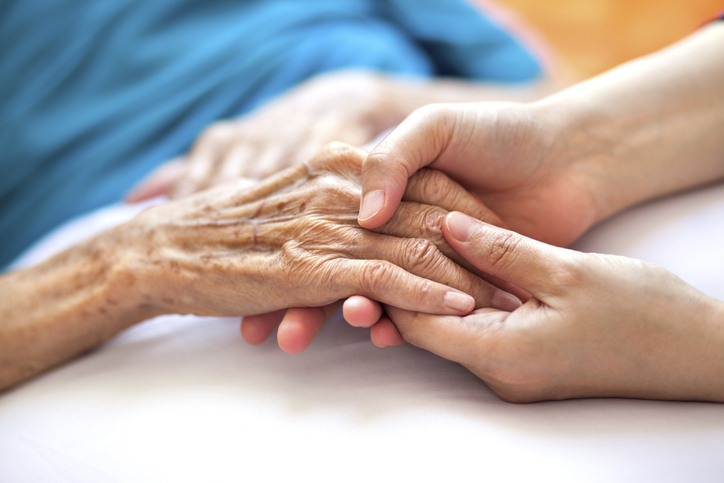
2. Good Personal Support Workers Know to Look For Physical Abuse
Seniors are often powerless to protect themselves, lacking the physical strength and, in some cases, the verbal abilities to prevent or report abuse. It is physical abuse if somebody hits an older adult or handles the person roughly, even if there is no injury. This type of abuse is sometimes passed off as a fall or other type of accident.
With that being said, you may be wondering how you can tell if a client is being physically abused if they don’t report it. A good indication that you should investigate an incident further is if the injury does not match the story behind how it happened. Ask your clients questions about their injuries. At the same time, monitor their physical responses to gauge if they are comfortable talking about it. Individuals trained at Medix College in our PSW course will be fully prepared to handle different abuse situations and know the importance of reporting incidents to their employers.

3. Watch For Signs Of Emotional Abuse
Emotional abuse (or psychological abuse) is typically inflicted in private because it can diminish the identity and dignity of the abused person. The most common forms of emotional abuse include name-calling, yelling, ignoring, threatening or insulting. In some cases, threats of institutionalization, isolation from social activities, or withholding access to loved ones may occur.
Unlike physical abuse, it’s not as easy to identify. A warning sign does not automatically mean abuse is happening; ask questions, seek advice from experts on abuse, and be respectful. Being aware is the first step. If you suspect an older adult is being abused, start by talking to the person, in private, and ask whether they feel safe at home and are being well cared for. If the situation is an emergency and you feel the person is at immediate risk, call 911.
PSW training at Medix College includes a course on Abuse and Neglect, where students will learn to examine the cycle of violence and indicators of abuse, as well as the role of the worker when abuse is suspected and reported. In less than a year, our PSW program will train you to provide care, support, and assistance to clients who are aging, chronically ill, or living with physical or mental disabilities.
Are you ready to become a personal support worker?
Contact Medix College to learn more about our program.








